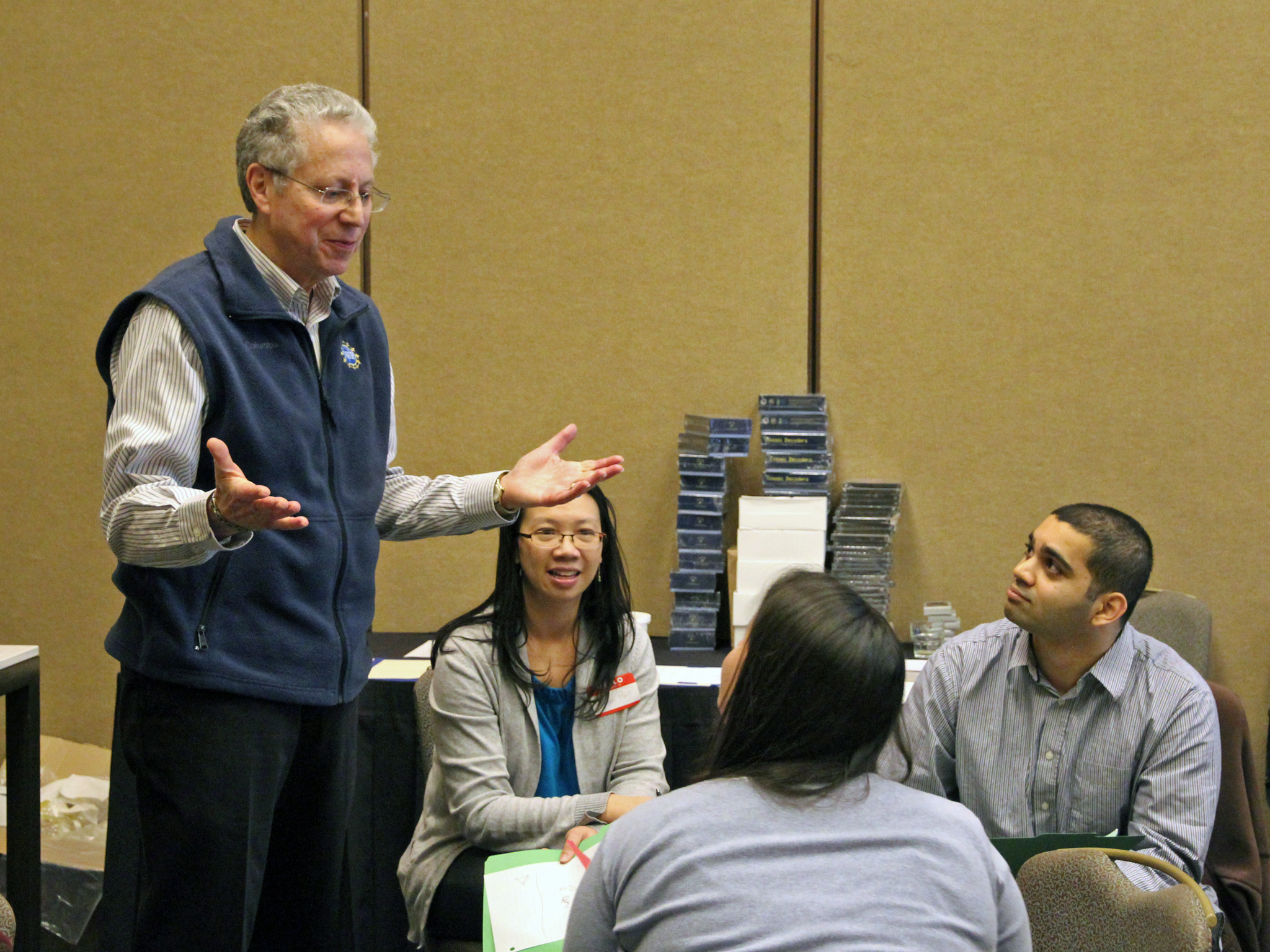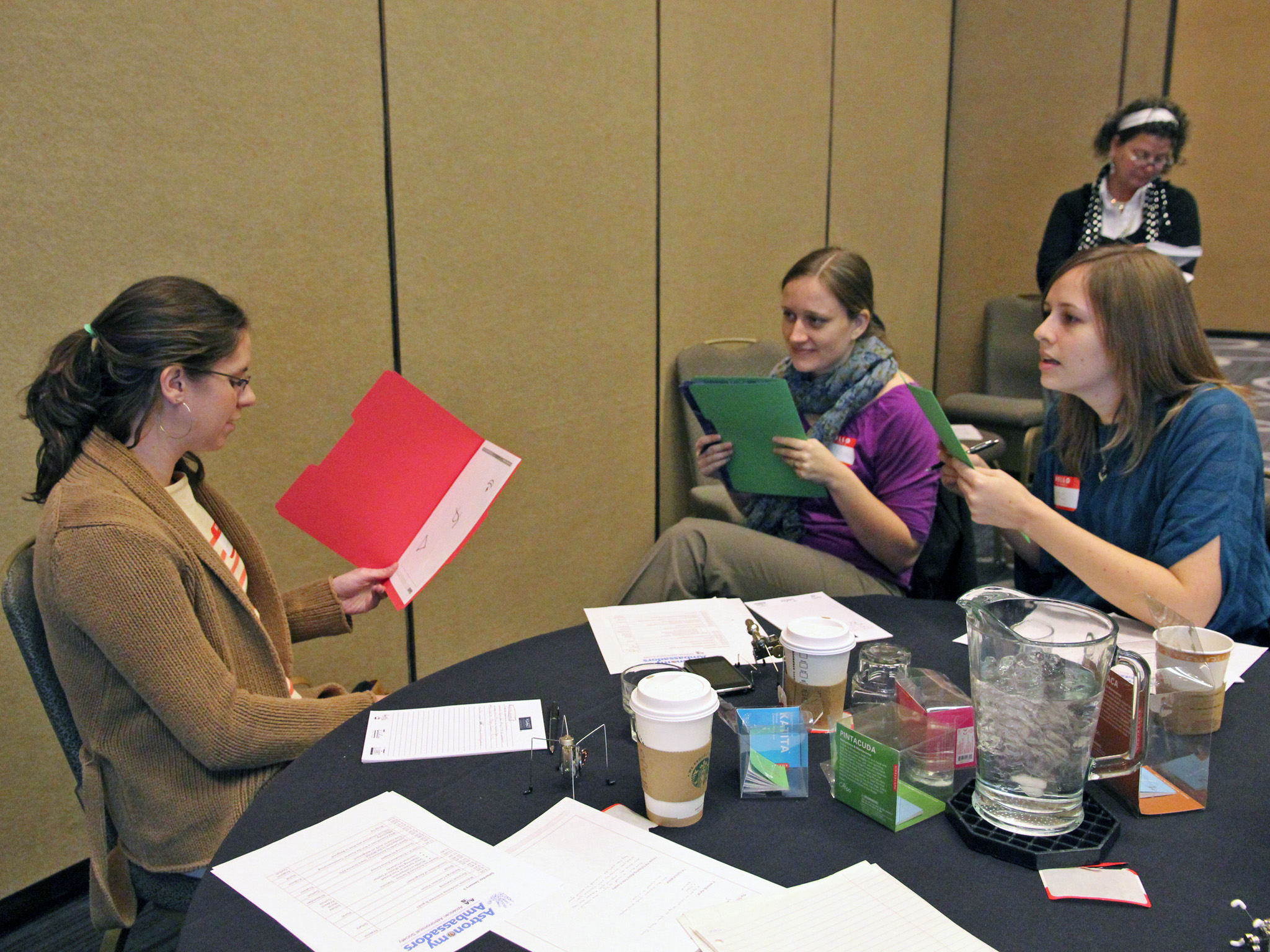A couple of days before thousands of astronomers descended on Long Beach, California, for the 221st meeting of the American Astronomical Society (or AAS) at the beginning of this month, a hundred or so attendees (including me!) gathered to share their enthusiasm for education and public outreach (often referred to as EPO). Some people were attending the Center for Astronomy Education workshop, geared toward helping astronomers teach Astro 101 classes more effectively, but I was one of thirty early conference-goers that made up the first-ever class of AAS Astronomy Ambassadors.
The Astronomy Ambassadors program is run by the AAS in partnership with the Astronomical Society of the Pacific (or ASP) and was designed to bring early-career astronomers (i.e., undergraduates, graduate students, postdocs, and young faculty) together, train them to conduct outreach, and foster a community capable of supporting future outreach endeavors. Efforts like this are ongoing across the country, with many departments already playing host to vibrant outreach groups. So why is this new program so important?
One reason is that the Astronomy Ambassadors program represents one of the first centralized efforts by the AAS to support and encourage astronomers to go out and share their knowledge and enthusiasm with the community. Since many outreach programs rely almost exclusively on the volunteer efforts of students and the occasional interested faculty member, that’s a pretty a big step for the astronomical community! And we have a special advantage as astronomers; as Andrew Fraknoi, astronomy department chair at Foothill College and one of the workshop organizers, said, “Astronomy is the gateway drug to an addiction to science.” Not everyone loves science, but a lot of people love astronomy!
The Astronomy Ambassadors program is also exciting for its emphasis on developing an ongoing relationship with local schools and organizations. Experience has shown that “random acts of EPO” (i.e., the occasional star party or even a big event like the transit of Venus) don’t have the same impact as repeatedly interacting with the same group of people, whether it’s a fifth-grade classroom or a rotary club. Project ASTRO is an existing ASP program that acknowledges this fact and pairs astronomers with classroom teachers in cities across the country. The genius of Project ASTRO is that the astronomers don’t only visit schools when the students are learning about astronomy, but show up throughout the school year and use hands-on science activities to supplement lessons on things like math and history. (If that sounds interesting to you, check to see if Project ASTRO is in your city; as an undergraduate, I participated in Project ASTRO in Tucson, and they regularly take undergraduate volunteers in the San Francisco Bay area.)

Dennis Schatz, senior vice president for strategic programs at the Pacific Science Center and outreach expert extraordinaire, discussing an activity with some of the workshop attendees. Photo by Rick Fienberg, © 2013 AAS
You could see these philosophical and pedagogical roots at the Astronomy Ambassadors workshop I attended at the beginning of January. Most of our two days together were spent actively engaging with one another, sometimes in an effort to push us out of our comfort zones, but mostly so we could discover useful strategies for ourselves. Teaching and outreach are not skills that come naturally to everyone, but they are definitely skills that everyone can improve, if only by remembering to do a few simple things like asking questions effectively and remembering to use a more universal vocabulary. This was echoed by Suzanne Gurton, another one of the workshop organizers and the education manager at the ASP, “I remember when I was first learning astronomy, I only knew how to speak about it the technical terms that were being taught… The language of math and physics can be very efficient and expressive for those who speak it, but I think the tools that we were using in the workshop will help you all address a broader audience, one that is not so fluent in physics and … give [you] the tools and language to reach the general public.”
One of the most exciting things I learned about was the wealth of astronomy activities and demos developed for the Astronomy from the Ground Up (AFGU) program. Because most people don’t think about astronomy every day, activities like these are critical for cementing astronomical ideas in people’s heads, ranging from basic concepts (like why there are seasons) to more advanced ones (like how astronomers detect exoplanets). As an astronomer who works on high-redshift galaxy formation and evolution, it’s sometimes disappointing when I realize that the public just doesn’t care about why the observed galaxy luminosity function doesn’t match theoretical predictions, but my frustration was finally answered when I learned about the AFGU activities that deal with galaxies and the Universe beyond the solar system. If you’re like me and are more interested in science education than outreach through amateur astronomy, these activities might be your ticket to getting involved.
In closing, I think it’s important to think about the future of these kinds of programs in astronomy. Given the diversity of outreach initiatives across the country and varying degrees of support from departments, the people behind the Astronomy Ambassadors program didn’t really know what to expect when they put out the call for applications ahead of the most recent national meeting, but in the end, there were eighty applicants for just thirty spots, and people applied from all stages in their careers. Several of the workshop organizers mentioned how (delightfully) surprised they were by the amount of public education and outreach young astronomers were already involved in, and they hope this will convince the AAS to hold more workshops like this in the future. Both Andrew and Suzanne were aware, however, that the future of the program depends on feedback from this first workshop and the success of its first crop of Ambassadors. But, if you’re interested in outreach, the overall takeaway message is this: keep doing what you’re doing and be on the look out for more opportunities to get involved in the future! It’s going to take a lot of energetic people to make a commitment to outreach a permanent part of the establishment, and that starts with you!
(Special thanks to Andrew Fraknoi, Suzanne Gurton, Dennis Schatz, Anna Hurst Schmitt, and all of the people responsible for the Astronomy Ambassadors program for the time and energy that went into organizing the workshop.)

